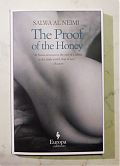
Salwa al Neimi
The Proof of the Honey
A review of The Proof of the Honey was written at the Complete Review. In it, the author complains for lack of erotic stimulation. I laughed out loud when I read that, attributed this imagined lack to his own lack. The gist of it is, the author must be male: he has never gone looking for the proof of his ejaculation.
The Proof of the Honey is not really an erotic book anyway. Sure, there are erotic bits drizzled like honey to keep things sweet, but that hardly seems its point. The Proof of the Honey flirts somewhere between language and sex. It is the intermingling of these two, as the nameless narrator declares—or more specifically, the intermingling of the Thinker and ancient erotic Arab texts—that has made the Age of Sexual Renaissance, [her] own personal renaissance.
The Thinker is not ideal man, for he is hardly a man at all. Men exist in a world that is not all sex; the Thinker does not. The Thinker is not even his own sex but exists only for her. He is an object of desire.
I would come to him completely wet. It was enough for me to think of him and I would be ready for love.
The Thinker is desire stripped down. Bodily desire. His desire for her creates her desire. Reading those secret ancient texts sparked in her long ago the desire for knowing such pleasure.
Desire is secret. Pleasure is secret. Sex is secret. Sex is the secret of secrets.
It doesn’t even seem to me that there can be an argument about the viability of The Proof of the Honey. The revelations of such secrets is nothing new to the western world, but it is the context in which this book sets them that is of supreme importance: a female in the Arab world. And for me it is not as much the Arab part—though important it is—as the female. We still have a necessity to know what women want like. In the realm of literature this genre is always overwhelmingly lacking.
In the words of Hélène Cixous — albeit 30 years ago:
It is precisely because there is so little room for her desire in society that, because of not knowing what to do with it, she ends up not knowing where to put it or if she even has it. This question conceals the most immediate and most urgent question: “How do I pleasure?”
It is the language of the body that women must use when writing. There is little use writing sex as we always see it. We must go underground. Go into the secrets. The “dark continent.” In the secrets we may find what has been buried there.
I knew that I was body alone, that I possessed nothing else. My body was my intelligence, my consciousness, and my culture. He who desired my body loved me. He who loved my body desired me. This was the only love that I knew, and the rest was literature.
I especially enjoyed Salwa al Neimi’s copious quoting of her secret readings: the erotic books. Was it just these quotes that caused such a stir in the Arab world and got this book banned? These quotes were certainly the book’s most erotic moments. It is as if these people want to forget their sumptuous sensual legacy… forget a whole language. I wish I could have read The Proof of the Honey in Arabic, for I could read that without it, in English, it was missing that language’s fluidity.
It was fortitude that brought me to this book, nestled into the mini-English section on the Isola Tiberina. Any note of a book being banned anywhere sparks an interest, as do most well written books about female sex. Reading a book such as this one is wonderfully liberating. And now Salwa al Neimi has gotten me curious: where are those old erotic Arab writers hiding?
· · · · · · · · · · · · · · · · · · · ·